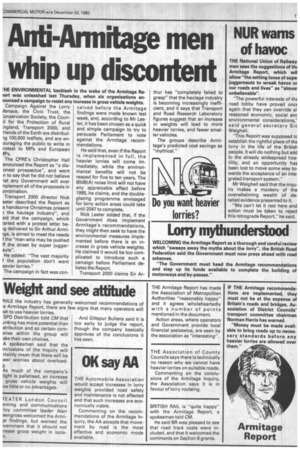Anti-Amitage men whip up discontent
Page 13

If you've noticed an error in this article please click here to report it so we can fix it.
The CPRE's Christopher Hall enounced the Report as "a disonest prospectus", and went n to say that he did not believe -iat any Government will ever nplement all of the proposals in ombination.
Transport 2000 director Nick ester described the Report as a handsome Christmas present ) the haulage industry", and aid that the campaign, which tarted with a protest letter beig delivered to Sir Arthur Armiige, is aimed to meet the needs f the "man who may be pushed ft the street by super juggerauts".
He added: "The vast majority I the population don't want aavier lorries."
The campaign in fact was con ceived before the Armitage findings were made known last week, and, according to Mr Lester, it has been chosen as a quick and simple campaign to try to persuade Parliament to vote against the Armitage recommendations.
He said that, even if the Report is implemented in full, the heavier lorries will come immediately, while the environmental benefits will not be reaped for five to ten years. The 80dB(A) noise limit will not have any appreicable effect before 1995, he claims, and the doubleglazing programme envisaged for lorry action areas could take until 2047 to complete.
Nick Lester added that, if the Government does implement Armitage's recommendations, they might then seek to have the environmental measures implemented before there is an increase in gross vehicle weights. He claimed it would be too complicated to introduce such a camaign before Parliament debates the Report.
Transport 2000 claims Sir Ar thur has "completely failed to grasp" that the haulage industry is becoming increasingly inefficient, and it says that Transport and Road Research Laboratory figures suggest that an increase in weights will lead to more heavier lorries, and fewer smaller vehicles.
The groups describe Armitage's predicted cost savings as "mythical."




















































































